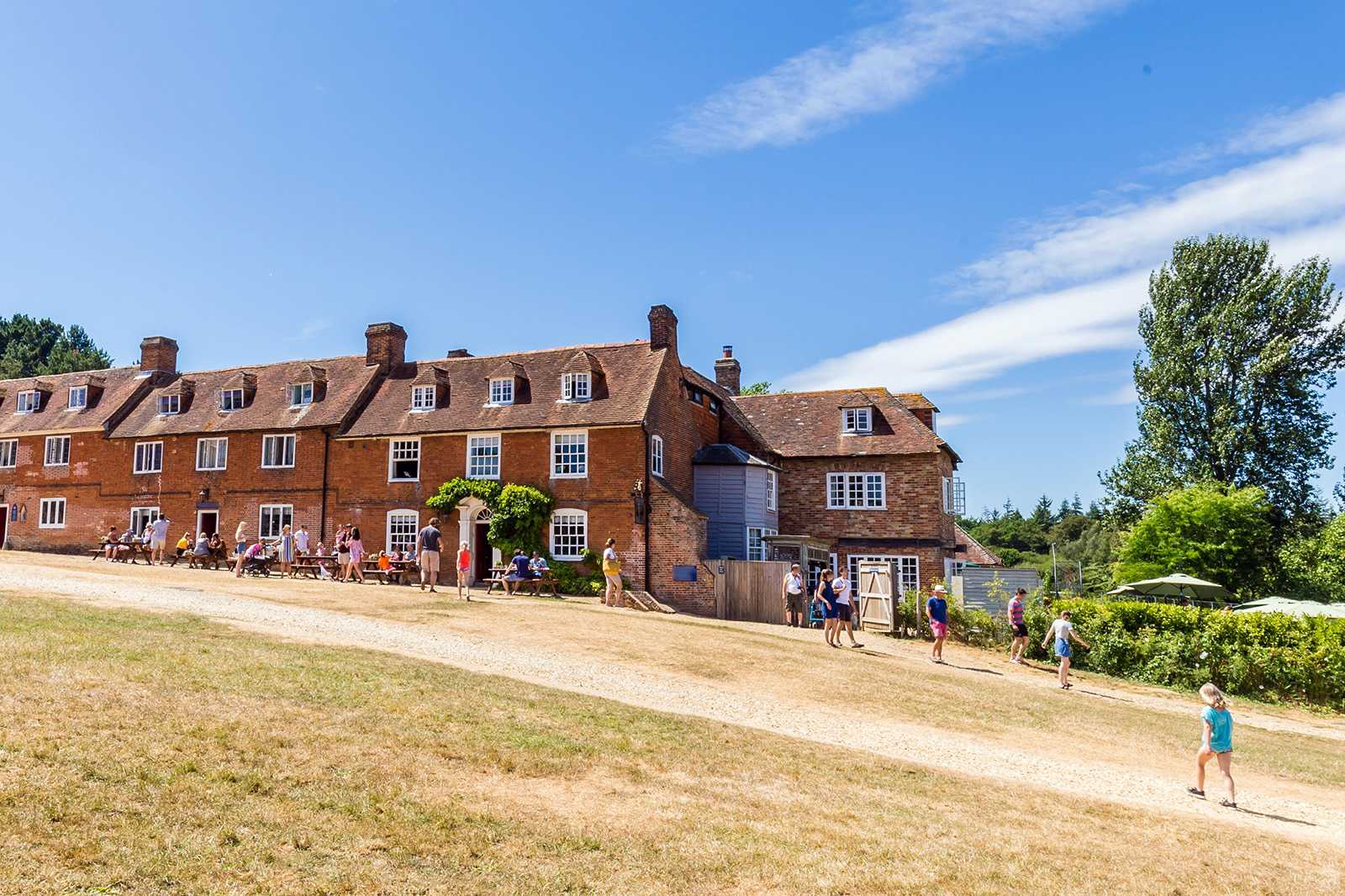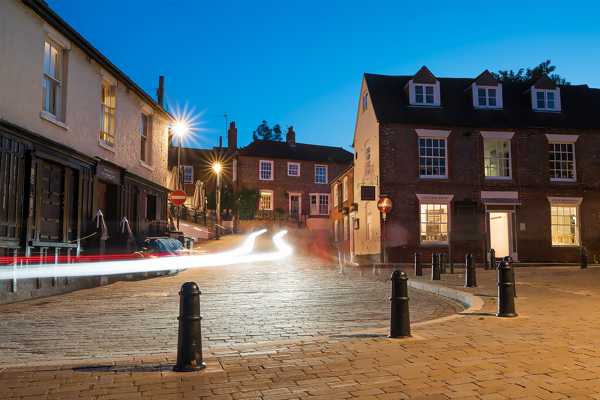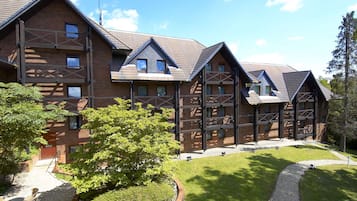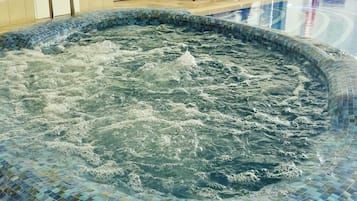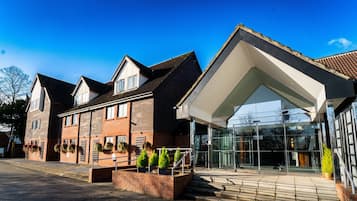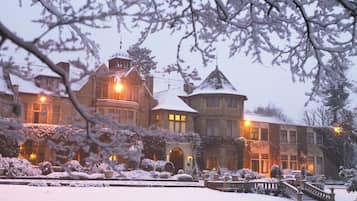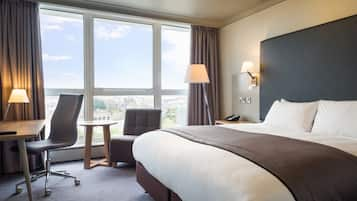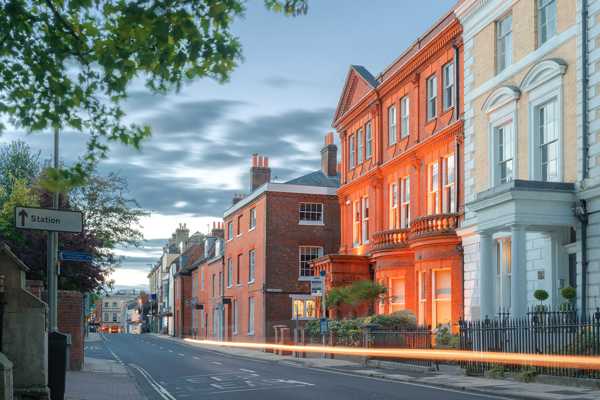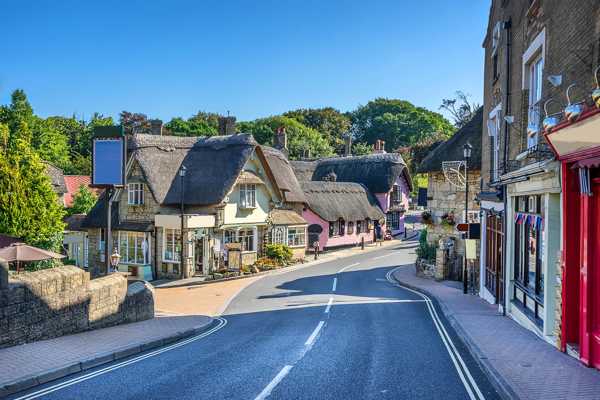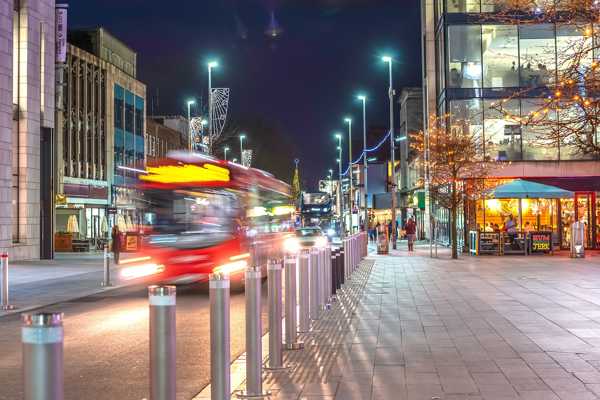The most picturesque villages in Hampshire lie within some of the most beautiful national parks in the South of England, and almost all are easily accessible via a short train ride from London or major cities such as Portsmouth and Southampton. You’ll see period homes, thatched cottages, medieval churches and countryside vistas in just about all of Hampshire’s villages. In some areas, wild ponies, donkeys and cattle still roam the streets.
Embark on some of England’s best natural trails in Hampshire, or learn about the history of naval shipbuilding in its unspoilt hamlets. Of all the towns you should visit in this postcard-pretty county, here are some of our favourites.
- 1
Milford on Sea
Spot the Isle of Wight from this scenic village’s quiet beach

- Couples
- Families
- History
Milford on Sea is a coastal village by the Solent straight. On a clear day, you can see the Isle of Wight from its cliffside trails and pebble beach, which has dozens of colourful beach huts climbing the hill. Surrounded by a ‘green belt’, Milford on Sea has avoided mass development and retained its traditional charm. The high street is lined with typical village pubs, shops and tearooms.
The village’s oldest building is All Saints’ Church, which dates back to the 13th century and is a short walk from the village green. Walk along the spit trail for about 1 mile to reach Hurst Castle, a former artillery fort originally established by Henry VIII during the 16th century.
Mapphoto by Lewis Clarke (CC BY-SA 2.0) modified
- 2
Chawton
Explore the former home of renowned author Jane Austen

- Couples
- History
- Photo
Chawton lies within the picturesque South Downs National Park. Its attractions include the Grade II-listed Elizabethan manor house Chawton House and the Grand Chawton House Library. But the village’s main draw is Jane Austen’s former home, Chawton Cottage, which is now a museum. Here, you can see where the famous novelist produced her finest works before embarking on a self-guided nature trail that details her life.
Drive 10 miles north of Chawton to reach Holybourne Hill, a vantage point that offers panoramic views of the Hampshire Downs. For a traditional afternoon tea, head to Cassandra’s Cup. If you’d prefer a pint after a day of hiking and sightseeing, pay a visit to The Greyfriar.
Map - 3
East Meon
Relish sprawling views of the South Downs

- Couples
- History
- Photo
East Meon is the highest village in the Meon Valley, where you can hike the surrounding hills to enjoy sweeping views of the South Downs National Park. Despite its small size, the village is home to around 50 listed buildings and is notable for its high density of hall houses, some of which date back to the 13th century. Walk along Workhouse Lane to see examples of charming thatched cottages.
The oldest surviving building in East Meon is the 12th-century All Saints Church, which resembles Winchester Cathedral. Head just outside the village to Old Winchester Hill to see the remains of an Iron Age fort.
Map - 4
Beaulieu
A beautiful village on the doorstep of the New Forest National Park

- Adventure
- Couples
- History
- Photo
Located to the southeast of the New Forest National Park, Beaulieu is a popular tourist spot for nature lovers searching for rare birds like the Dartford Warbler and the Eurasian Hobby. The most popular attractions include the National Motor Museum and Palace House, a gothic country manor dating back to the 13th century.
Roam the streets to see rows of Buccleuch Cottages, which feature distinctively tall chimney stacks and dormer windows. If you’d prefer to soak up some nature, head to the nearby Hatchet Pond where you’ll see ponies, cattle and donkeys grazing by the waterside.
Map - 5
Buckler’s Hard
View Georgian terraces by the river in this historic shipbuilding hamlet

- Couples
- History
- Photo
Buckler’s Hard is just a short drive from the North Solent National Nature Reserve by the banks of the Beaulieu River. With its rows of waterside Georgian cottages, this hamlet looks almost the same as it did at the turn of the 19th century, when it played a major role in Britain’s shipbuilding industry. Today, you can learn about this hamlet’s shipbuilding legacy by visiting Buckler’s Hard Maritime Museum.
Gain an insight into the ancient history of Buckler’s Hard by going on a guided river cruise tour, which run throughout spring and summer. To see what life was like for the shipwrights and labourers here, head to the 18th-century Shipwrights Cottage.
Map - 6
Longparish
Traverse 20 miles of trails in a village comprised of 4 hamlets

- Adventure
- Budget
- Couples
Even though this village has a population of around 750, it’s comprised of 4 medieval hamlets – Middleton, East Aston, West Aston and Forton – that together contain around 90 listed buildings. Popular activities include fishing and nature walks around the Test Valley. But if you want a taste of British village life, stroll the streets to view the charming thatched cottages and stunning riverside scenery.
There are over 20 miles of footpaths in Longparish, the Riverdance Walk being one of the most popular. Remember to pack a map and plenty of water – it’s easy to get lost as you amble around the surrounding countryside, but the views are some of the best in Hampshire.
Mapphoto by Mike Cattell (CC BY 2.0) modified
- 7
Wickham
See the historic buildings that surround the large medieval square

- Couples
- History
- Shoppers
Wickham is home to England’s second-largest medieval square, which is surrounded by 15th-century cottages, Georgian terraces and plenty of pubs, restaurants and tearooms. The village’s independent shops sell unique chocolates, antiques and crafts. You can also pick up products ranging from clothes to jewellery at Chesapeake Mill, which was constructed using timbers from a captured US Navy frigate in 1820.
For a unique experience, visit the 19th-century Dip Hole to see where the village’s former residents collected water. Then see Dead Man’s Plack, a Grade II-listed monument to Æthelwald, Ealdorman of East Anglia. If you want to absorb stunning natural views, walk along the River Meon towards the village of West Meon. You’ll pass lots of traditional pubs and resting points on the way.
Mapphoto by Herry Lawford (CC BY 2.0) modified
- 8
Buriton
Experience quaint village life in this hiking mecca

- Adventure
- Budget
- Couples
Buriton is a small village with just 2 pubs, but it’s village pond, period homes and the notable Buriton Manor House make this Hampshire settlement a picturesque gem. Local attractions include the Old Winchester Hill Iron Age Fort and the medieval St Mary's church, which has distinctive Norman arches and Sedilia seats. But the numerous nature trails are the village’s main draw.
See some of the best views of the South Downs by following the South Downs Way or the Sussex Border Path. More experienced hikers might prefer scaling the heights of Oakham Hill or War Down. Head to the nearby Butser Hill National Nature Reserve to spot a wide array of colourful butterflies.
Mapphoto by Simon Burchell (CC BY-SA 4.0) modified
- 9
Wherwell
Stroll down quaint country lanes lined by thatched timber cottages

- Couples
- History
- Photo
Wherwell and the neighbouring town of Chilbolton are filled with narrow lanes lined by Tudor-style thatched cottages. At Chilbolton Cow Common, you can look out for kestrels, red kites and egrets while the kids splash around in the shallow water. If you want to admire the village’s architecture, roam the streets to see nearly 40 listed buildings, which include the Church of St. Mary the Less and the Room Cottages on Village Street.
For some tasty and affordable British pub grub, visit the historic White Lion pub, which occupies a 17th-century inn and serves real ales, fine wines and takeaway bites for hikers. For a waterside dining experience, head to The Mayfly and absorb views of the River Test and the surrounding countryside.
Map - 10
Burley
A traditional village with a cider maker, tearooms and free-roaming ponies

- Adventure
- Couples
- Families
- History
- Photo
Burley is becoming an increasingly popular tourist destination thanks to its traditional customs and community atmosphere. Today, you can still see ponies and cattle freely roaming around the village, and there are lots of quaint art galleries, tearooms, antique shops and boutique clothing stores to explore. Burley is also home to at least 23 Bronze Age barrows, which you can visit by hiring a bicycle from the village Cycle Hire Centre.
If you’re a nature lover, you’ll enjoy nearby attractions such as the New Forest National Park and the Bolderwood Deer Sanctuary. If you want to step back in time during your visit, explore the village’s picturesque country lanes on a wagonette ride.
Map
